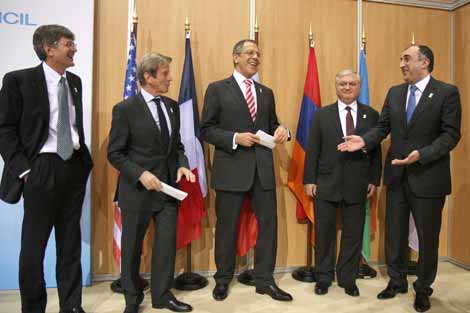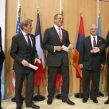
Mediating Powers Make New Push for Karabakh Peace
Publication: Eurasia Daily Monitor Volume: 6 Issue: 228
By:

The United States, Russia and France have again stepped up their efforts to broker a solution to the Karabakh conflict. Top diplomats from the three mediating powers urged Armenia and Azerbaijan to hammer out a framework peace accord “as soon as possible” after intensive Armenian-Azerbaijani peace talks held on the sidelines of the OSCE’s December 1-2 ministerial meeting in Athens. French Foreign Minister Bernard Kouchner was reportedly confident that a deal could be reached in the coming months. His optimism was called into question, however, by the conflicting parties’ continuing different public interpretations of peace proposals made by the American, French and Russian co-chairs of the OSCE’s so-called Minsk Group on Karabakh.
The Athens talks came just over a week after Armenian President Serzh Sargsyan and his Azerbaijani counterpart Ilham Aliyev held their sixth face-to-face meeting this year in Munich. In a statement posted on the OSCE website on November 23, the Minsk Group co-chairs described the meeting as “constructive.” “In some areas, progress was made. At the same time, some issues still remain open,” they said without elaboration.
Addressing a convention of his Republican Party of Armenia on November 28, Sargsyan cautioned that the negotiating process “may take years.” But he also stressed: “The current stage of the conflict’s resolution gives me reason to hope that we could bring it to a logical conclusion within a reasonable period of time” (Armenian Public Television, November 28).
Armenian Foreign Minister Edward Nalbandian and his Azerbaijani counterpart, Elmar Mammadyarov, followed up on the Munich summit by holding bilateral talks and separate meetings with the three co-chairs in Athens on November 30 and December 1. The two-day flurry of diplomatic activity culminated in their joint session with Kouchner, Russian Foreign Minister Sergei Lavrov and US Deputy Secretary of State James Steinberg. An ensuing five-party statement (www.osce.org/item/41737.html) said that Nalbandian and Mammadyarov reaffirmed their countries’ “commitment to work intensively to resolve the remaining issues” preventing their acceptance of the “basic principles” of a Karabakh settlement that were formally put forward by the mediators in Madrid in November 2007. It said the mediating powers had urged Baku and Yerevan to “complete this work as soon as possible.”
The foreign ministers of the 51 other OSCE member states strongly backed the call at the end of the two-day meeting in the Greek capital. “We urge the parties to sustain the positive dynamic of the negotiations and strongly support their commitment to finalize the basic principles on the peaceful settlement of the Karabakh conflict, based on the Madrid document in order to begin drafting a comprehensive peace agreement in good faith and without delay,” read a joint ministerial statement adopted at the conference (www.osce.org/documents/html/pdftohtml/41849_en.pdf.html).
Kouchner was particularly optimistic that Baku and Yerevan will soon overcome what the mediators have repeatedly described as their “few remaining differences” related to the Madrid document. “I am confident it will be done. Immediately? No. In the coming months? Yes,” he told journalists (Trend, December 1). “Now is the time to make decisions,” the French minister appealed to the two parties in a speech at the OSCE conference earlier in the day.
The so-called Madrid principles, disclosed by the mediators in general terms, call for a phased settlement of the Karabakh conflict that would start with a gradual liberation of the seven districts in Azerbaijan, which were fully or partly occupied by Karabakh Armenian forces during the 1991-1994 war. In return, Karabakh’s predominantly Armenian population would be able to determine the disputed enclave’s status in a legally binding referendum. Armenian-Azerbaijani disagreements have until now centered on crucial practical modalities of the proposed referendum, the timetable for Armenian troop withdrawal as well as the legal status of a future land corridor between Karabakh and Armenia.
The parties have raised more questions about their ability to iron out those differences by offering, at least in public, conflicting interpretations of both the proposed settlement and the Karabakh-related documents adopted during the OSCE gathering. The five-party statement, for example, made clear that a peace deal should be based on a combination of the internationally recognized principles of non-use of force or threat of force, territorial integrity of states and self-determination of peoples. Nalbandian touted this as a major achievement for the Armenian side, saying that Azerbaijan for the first time formally accepted the Karabakh Armenians’ right to self-determination (Aravot, December 2).
However, Mammadyarov insisted on the restoration of Azerbaijani control over the territory in his speech at the OSCE forum. “Providing self-governance for Karabakh within Azerbaijan will be a just and durable solution,” he said (www.armenialiberty.org, December 2). Aliyev’s chief foreign policy aide, Novruz Mammadov, likewise said that Baku can only settle for a “broad autonomy” for Karabakh. “It is openly indicated in the Madrid principles that the Armenian community of Karabakh can decide its fate, together with the Azerbaijanis living there, within the framework of Azerbaijan’s territorial integrity,” he claimed (www.zerkalo.az, December 5).
Armenian leaders maintain that the Karabakh Armenians would be able to vote for independence, reunification with Armenia or return under Azerbaijani rule in the would-be referendum, a claim that is privately confirmed by some Western diplomats privy to the peace process. Just how the warring sides can reconcile these opposite visions of Karabakh peace is still unclear. Despite the lingering uncertainty and confusion, Mammadov seemed to suggest that Kouchner’s optimism on the peace prospects is not unfounded. “I think that when making such a statement [Kouchner] comprehensively analyzed all processes and substantiated his position,” the Azerbaijani official said.




